Sessions Court shooting: Police, lawyers blame poor security on each other
Police beef up security, reduce length of shifts.
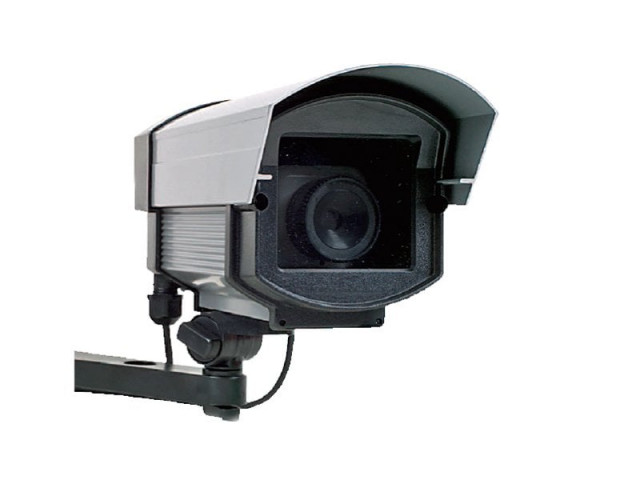
A gunman shooting dead two and grievously injuring two others before escaping has been captured clearly in CCTV footage. PHOTO: FILE
“They said ‘It was raining’. This was their explanation for how the weapon got through undetected,” laughs Nauman Qureshi, president of the Lahore Bar Association, recalling his meeting earlier this week with senior police officials about the massive security lapse on June 15 at Lahore’s Sessions courts.
On June 20, a Grade 8 student shot and killed the man he said had opened fire on his father during a break in, permanently damaging his legs. The boy has been arrested.
A gunman shooting dead two and grievously injuring two others before escaping has been captured clearly in CCTV footage of the Lahore incident. The assailant is seen brazenly firing a pistol in a court room. The victims had been on trial for a murder in 2011.

The police are yet to make any arrests though they claim that they have raided the homes of the party suspected. Islampura SHO told The Express Tribune that the two parties were involved in a violent dispute over land. Up to a dozen related murders had been committed before the court shooting, he said.
“He was bleeding like an animal sacrificed on Eidul Azha,” shudders Qureshi, who arrived at the scene of courtroom carnage in time to witness an injured man being tended to by colleagues. Qureshi is among several advocates who believe the incident raises serious questions about security arrangements at the courts – not least of all why, of the more than 40 police officers, including plainclothes agents, deputed at the court, not one rushed to the scene after the first shots were fired.
Former Lahore Bar Association secretary Farhad Shah was first to respond by telephoning emergency services and summoning police for help. “The alarming thing is that they didn’t come of their own accord”, he told The Express Tribune, adding that when he asked a policeman to fire some shots in the air to ward off the gunman, the officer’s firearm faltered. Eventually, a gun was fired by another court security official, shortly after which the gunman fled.
Former Lahore Bar Association president, Shehzad Hassan Sheikh, during whose tenure a spate of similar incidents led to a strike by lawyers in 2011-2, pointed out that the Sessions Court presented a unique security challenge – rival parties and individuals confront one another in potentially volatile situations, often in trials over violent crimes.

Both Qureshi and Shah expressed serious doubts over the efficacy of the metal detectors and frisking at the entrance. The former said that the officials assigned were “poorly motivated and ill-trained”. Smuggling a weapon into the judicial complex, said Qureshi, would not be especially difficult.
A visit by The Express Tribune would appear to lend credence to these claims: less than a week after the violent incident, checking at the entrance consisted of little more than a token brush of the shoulders by uninterested guards.
Others, however, were hesitant to lay the blame entirely on police, pointing out that lawyers themselves have contributed to inadequate security by arrogantly refusing to submit to searches at the entrance and insisting on parking their cars on the court premises in violation of rules.
Chaudhry Mohammed Tariq Javed, the judge in charge of security in Lahore’s lower courts, said it was entirely possible that the gunman was allowed to enter without being searched at the behest of a lawyer. He showed The Express Tribune a handwritten report filed by a security official – barely four days after the shooting – two lawyers had forced their car through the gate and sworn at police who tried to check them.
Such occurrences are extremely common, he says, adding: “Every two or three days I receive a business card handed to the guards at the entrance by a lawyer who refused to be searched.” The cards, he explained, are handed out with assurances that the individual in question is a person with connections that exempt them and their guests from being treated like ‘ordinary members’ of the public.
Inspector Mobeen Butt, the uniformed officer who was made in charge of security recently, told The Express Tribune that his staff clash with lawyers refusing to be searched up to 10 times a day, “They feel insulted if we check them.”
Qureshi says the number of lawyers who resist security checks is small. “We are doing our best to change their attitudes. It is quite wrong, however, to suggest that all lawyers are to blame for the actions of a small number.” He added, “In any case, it was the police’s responsibility to seal the exits after the shooting. Lawyers surely cannot be blamed for this.”
The Lahore Bar Council and subordinate judiciary have pledged to pay for 50 per cent of the costs for upgrading security. The police have increased the number of officers assigned to security duty (though the police and court security differ on the numbers) and reduced the length of their shifts by half (from eight to four hours) to prevent negligence resulting from fatigue. Critics fear such changes are cosmetic and likely to disappear within a short space of time. Former Lahore Bar Association secretary Farhad Shah said that in his experience a short period of vigilance invariably followed such incidents before familiar patterns set back in.
Published in The Express Tribune, June 24th, 2013.

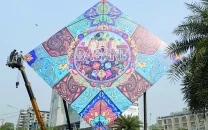

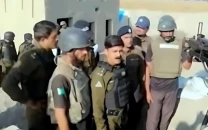
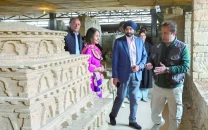
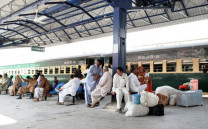













COMMENTS
Comments are moderated and generally will be posted if they are on-topic and not abusive.
For more information, please see our Comments FAQ